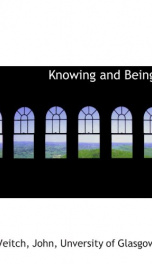knowing and being

Purchase of this book includes free trial access to www.million-books.com where you can read more than a million books for free. This is an OCR edition with typos. Excerpt from book: 35 II.NATURE AND CONSCIOUSNESS, AS IN ME GREEN'S 'PROLEGOMENA TO ETHICS.' Every one with an adequate conception of the relations between Psychology and Metaphysics on the one hand, and Ethics proper on the other, will accept the position that the ground and possibility of a theory of moral obligation and a moral ideal for man are to be sought for in the two first-mentioned sciences. The problem of Ethics is not merely to generalise the modes of human conduct, as in actual experience ; it is not simply to afford certain kinds of prudential injunctions as to action in given circumstances. The science of Ethics seeks to find the ground of moral obligationthe rationale of the " ought" to exhibit the moral ideal or ideals of life, as grounded on a view of the whole nature of man. A psychology which reduces man to a mere bodily organism, or to a series of reflex states called sensations, resulting from stimuli on thisorganism, may give rise to an ethics of prudence of caution and care for the pleasure and continuance of life ; it cannot ground moral obligation in any real sense of the term, and it fails as completely in exhibiting any true moral ideal. It is a worthy task, therefore, to seek in the psychology of man a ground, if that can be found, of moral obligation and moral lawfacts compatible with those conceptions, and fitted to yield them a basis in reality. But not less important than the bearing of Psychology, or an analysis of knowledge on Ethics, is its relation to the great ontological question of the being and nature of God. This question must be approached through an analysis of knowledge, and can only be determined through this analysis. Facts, data, scientific generalisations and results, are no doubt in the first place essential to the determination ; but i...
Info about the book
Author:
Series:
Unknown
ISBN:
1581501544
Rating:
4/5 (3)Your rating:
0/5
Languge:
English
Users who have this book
Users who want this book
What readers are saying
What do you think? Write your own comment on this book!
write a commentif you like knowing and being try:
Other books by this author
Do you want to exchange books? It’s EASY!
Get registered and find other users who want to give their favourite books to good hands!


